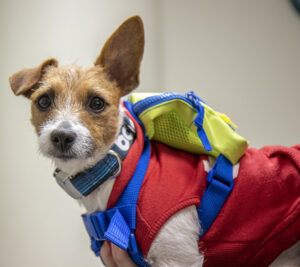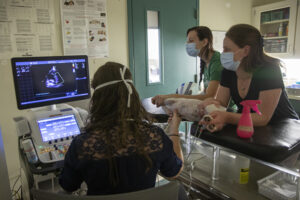VHC cardiologists treat puppy for rare defect

Ruby has more than 1,000 followers on Instagram. She often wears a red hoodie and a backpack, where she carries treats.
Jessica Bascus, a native of Marceline, Missouri, adopted a Jack Russell terrier puppy in December of 2019. The puppy, whom she named Ruby, was surrendered to a local veterinarian with a known heart murmur. Bascus heard about Ruby from a friend and decided she was going to foster the puppy, but during their first meeting she knew it wasn’t going to be a temporary relationship. “I absolutely fell in love with her the moment I saw her,” said Bascus. “I just knew she was going to be a part of our family.”
Bascus had recently adopted another puppy before Ruby came along. She noticed that Ruby was sluggish, not running with the other puppy and struggling to keep up. This prompted her to visit a local veterinarian in Kansas City, who uncovered that she had a more serious problem than just a heart murmur. Bascus brought Ruby to the Veterinary Health Center at Mizzou, where Kelly Wiggen, DVM, says they diagnosed the puppy with two congenital heart defects, a double chambered right ventricle (DCRV), which is very rare, and a ventricular septal defect (VSD). “When she came in for evaluation, her physical exam was a little unusual in that her heart murmur wasn’t as loud as I would have expected for the most common types of congenital heart diseases, especially if it was truly causing exercise intolerance,” said Wiggen. “To determine what was happening to cause the murmur and her exercise intolerance, we performed an echocardiogram, where we diagnosed her with the two congenital heart defects.”
Unfortunately, the VSD was not treatable due to potential complications with surgery and its location, but the DCRV could be improved through a high-risk procedure called combined cutting balloon and high-pressure balloon membranoplasty. “We had a long discussion about this procedure,” said Wiggen. “DCRV is a very rare congenital heart disease so there aren’t very many reports of this in the literature, and of the reports that do exist, some dogs responded favorably to surgery and some dogs did not. The procedure can have serious complications such as damage to a nearby valve, abnormal heart rhythms, perforation of the heart, and death. It was also hard to predict how her heart would respond to treatment and whether her VSD would cause any issues over the long term.”

VHC Clinical Instructor Kelly Wiggen, DVM, performs an echocardiogram during Ruby’s three-month recheck. She is assisted by Amanda Alviso (center), a veterinary assistant, and Nekesa Morey, DVM, a resident in the Cardiology Service.
The surgical process is intense and risky. “The procedure involved first inflating a cutting balloon, a balloon with very sharp razor blades on it, across the narrowing to create tiny cuts, and then replacing it with a much larger and higher pressure balloon to expand the initial cuts and widen the narrowing in a controlled manner,” said Wiggen.
Wiggen says that the surgery was successful and Ruby has made noticeable improvements. “We were able to successfully widen the narrowing to the point where the pressure in the upper chamber of her right ventricle was lower than the left ventricle, this meant that the direction of her VSD was reversed back to the “normal” direction and she no longer had deoxygenated blood being sent out to her body,” she said. “After surgery appeared an initial success, the next big question was whether the improvement would be maintained over a longer period of time. We just saw Ruby for her three-month recheck and she had been doing great at home with no exercise intolerance. We are very happy to report that her echocardiogram showed that the improvements that we made with surgery have persisted and that she has had further improvement to her heart size as well. We are hopeful that the improvements that we made to her DCRV will persist and that her VSD won’t cause her any problems; we will be periodically keeping an eye on Ruby’s heart with recheck echocardiograms to monitor her progress.”
Bascus says that Ruby is now doing great at home and is showing no signs of slowing down. “I take Ruby running all the time with my other dog, and she is so close to catching him even though he has longer legs. It’s pretty amazing,” she said.
Ruby, who just turned 1-year-old, is now a bit of a celebrity. She has more than 1,000 followers on her Instagram account, which is @ruby.therussell and managed by Bascus. She is often seen wearing a red hoodie and backpack, in where she carries her treats in case someone wants to interact with her in public. Bascus says she is also looking into therapy training for Ruby because of her friendly demeanor. “It doesn’t matter where I go, Ruby is so welcomed by everybody.”
By Nick Childress



